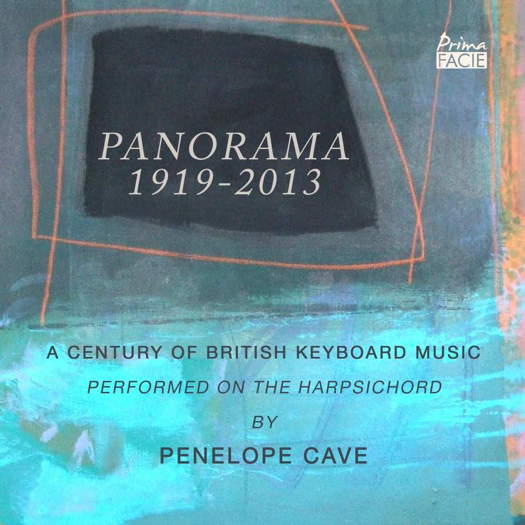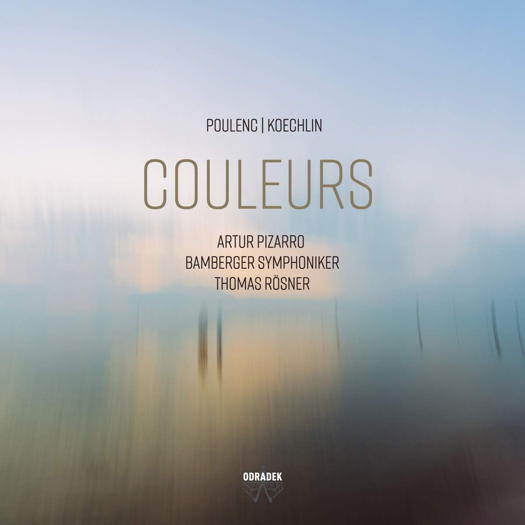- Telemann
- Adrian Williams
- Dennis Brain
- opera seria
- Hoffnung Festival of Music
- John Corigliano
- Indonesia
- Miriam Allan
 SPONSORED: Vocal Glory - Massenet's Manon in HD from New York Metropolitan Opera, enjoyed by Maria Nockin.
SPONSORED: Vocal Glory - Massenet's Manon in HD from New York Metropolitan Opera, enjoyed by Maria Nockin.
All sponsored features >>
 SPONSORED: CD Spotlight. A Fantastic Collection. Penelope Cave Panorama CD. Little-known harpsichord gems, strongly recommended by Alice McVeigh.
SPONSORED: CD Spotlight. A Fantastic Collection. Penelope Cave Panorama CD. Little-known harpsichord gems, strongly recommended by Alice McVeigh.
All sponsored features >>

Undoubtedly Colourful
Music by Poulenc and Koechlin,
heard by PAUL SARCICH
'Odradek and the Bambergers have produced clean, well-balanced recordings and treated both composers with great sensitivity. The orchestral playing is first rate.'
Two works by Poulenc and two by Charles Koechlin feature on this album, the title justified by the undoubtedly colourful music we would expect from early-mid twentieth century French composers.
Poulenc's Sinfonietta is titled somewhat self-deprecatingly, with four movements and at nearly thirty minutes it has claims to being a full-scale symphony. The first movement puts us firmly into the Poulencian world - a world of eclecticism, where flowing, even sombre themes are juxtaposed with moments of explosiveness and light, where snippets of self-quotation mix with bits stolen from other composers. Written for the then BBC Third Programme and premiered in 1948, this movement may not always be sunny, but it is not full of angst either, despite its suddenly serious ending after a lot of previous good humour.
The scherzo second movement is played here with a great spirit of playfulness, having more than a hint of Bizetian folk-danciness, as well as influences from Tchaikovsky and Mozart. The slow third isn't all that slow, having plenty of movement in its treatment of the chanson-like themes. This could easily be ballet music, never getting heavy or maudlin even though there is a real whiff of nostalgia, especially in the second main theme.
The Finale returns us to the world of the first movement: self quotations, a direct steal from Mozart's A Little Night Music, and an Offenbachish section which summons up the world of Parisian theatre, all contrasted with a darker, more dramatic middle section before a return to the hi-jinks of the opening and a filmic coda.
The Bamberg Symphony, although noted for its dark sound, is sensitive to Poulenc's idiom, and conductor Thomas Rösner's familiarity with it since his students days means that nothing is laboured, a suitable flow is maintained throughout, and it would be invidious to single out individual soloists or sections for all the excellent solo work. This comes across as music that simply flowed out of the pen.
Listen — Poulenc: Très vite et très gai (Sinfonietta)
(track 4, 0:12-1:02) © 2019 Odradek Records LLC :
The Piano Concerto was not terribly well-received at its Boston premiere in 1950, and is not on the A list of piano concertos today. Poulenc's eclecticism and love of stark contrast may have been too much for the Bostonians then, and too much for some now, as it is even more marked here than in the Sinfonietta. Rachmaninov's spirit hovers over much of the first movement, but filtered through a Parisian sensibility. Pianist Artur Pizarro is aware of this and does not indulge in tub-thumping, keeping the octave work chirpy and not trying to overwhelm in the passages where the notes flood out. There is a chamber music-like air to this performance, a good balance between piano and orchestra, lots of short solos in the orchestral writing, and a mix of the Romantic and Neoclassical. 4:43-5:20 shows how Poulenc can switch musical worlds almost insouciantly, and the whole movement rips through styles from the wistful to the fanfaric.
Listen — Poulenc: Allegretto (Piano Concerto)
(track 5, 4:36-5:20) © 2019 Odradek Records LLC :
This continues into the second movement, as a nostalgic, drooping main theme (which could so easily be a 1950s movie title theme), interrupted by dramatic outbursts of more heroic stuff. Pizarro and the orchestra give it all its due, but it won't be everyone's idea of a slow movement; many may wish for more work on that first theme.
There is excellent crispness from Pizarro in articulating the rapid work which opens the third movement, and a suitably chirpy style for Poulenc's often cheeky phrases (including a sea shanty). The ending perhaps, says it all: Poulenc just runs it out down a scale, no heroics or blazing virtuosity to finish with.
Listen — Poulenc: Rondeau à la Française (Piano Concerto)
(track 7, 3:11-4:00) © 2019 Odradek Records LLC :
This anticlimactic ending must have upset those who expect every concerto to end in a lather of notes, and the rapidly changing stylistic mix of the whole piece has probably guaranteed its relative obscurity. But if you can live with the relentless darting about of Poulenc's mind, there is much enjoyment to be got out of this.
Charles Koechlin is one of those composers, loved and even venerated in his day, who seems to have fallen right off the radar screen of musical life as time has gone on. Among the French, one also thinks of D'Indy and Roussel. Although a polymath, into astronomy, film stars, photography, medieval music, socialism, and making a lifelong project out of The Jungle Book; his devotion to furthering young composers meant he never got a permanent teaching position, and suffered a lack of worldly success despite a large output. He also cleaved to the tone poem at a time when it was becoming unfashionable, and the two heard on this CD, with opus numbers of 129 and 130, date from 1933 but were not premiered until the 1980s.
Vers la voûte étoilée comes from his interest in astronomy, and opens with high, quiet string and woodwind writing, a test of tone and intonation for any orchestra. Koechlin has his own tonal language, which initially is disquieting and takes some getting used to: this is not Debussy, or Ravel, or any of the other tone poets of the time like Strauss, Bax or Delius. Constantly shifting tonalities are spiced with dissonances, with some lovely sinuous melodies threading their way through the textures. 6:02 - 6:43 contains a particularly ear-catching horn solo.
Listen — Koechlin: Vers la voûte étoilée
(track 8, 6:02-6:43) © 2019 Odradek Records LLC :
Climactic passages there are, but these are never bombastic. This certainly justifies the title of the disc, although strangely, there is no use of percussion.
Sur les flots lointains is slow and elegaic, opening with low string and wind writing this time, and is overall a darker, more sombre piece, with moments of great stillness. It also contains long, sinuous lines, but - and here's the rub with Koechlin's writing - not of great memorability. This, and the wandering nature of his music, mean that you're unlikely to come out if it with any earworms, as lovely as the sound-bath may be. I suspect that this more than anything has led to his neglect. But if you can get into his personal harmonic space, as one has to do for such as Delius, rewards are to be had.
Listen — Koechlin: Sur les flots lointains
(track 9, 4:32-5:32) © 2019 Odradek Records LLC :
Odradek and the Bambergers have produced clean, well-balanced recordings and treated both composers with great sensitivity. The orchestral playing is first rate. If your life needs some colour, you'll find it here.
Copyright © 15 April 2019
Paul Sarcich,
London UK

CD INFORMATION: POULENC | KOECHLIN - COULEURS


